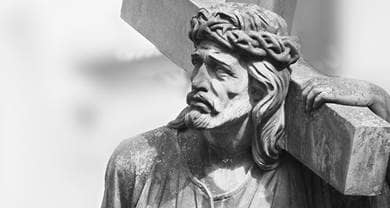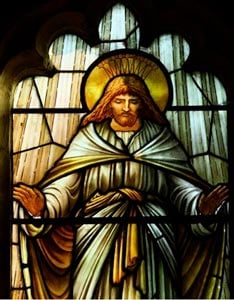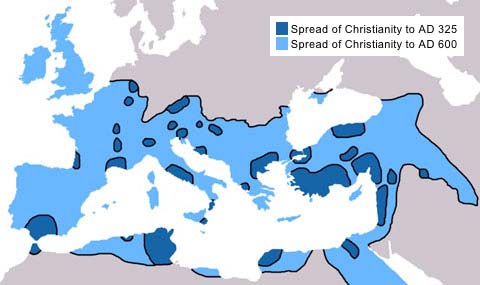- Trending:
- Olympics
- |
- Forgiveness
- |
- Resurrection
- |
- Joy
- |
- Afterlife
- |
- Trump

RELIGION LIBRARY
Christianity
Vision for Society
 Christianity is an eschatological faith that seeks the coming Kingdom of God. Deeply rooted in Judaism, Christianity shares the Jewish expectation of a final day of judgment, called the Day of the Lord. On this day, humanity will see God or God's representative, the Messiah, and all injustice will be brought to light in a final reckoning. Once injustice has been exposed and punished, God's perfect justice will prevail. The New Testament writers share this expectation, with the characteristic Christian belief that it is Jesus the Messiah who will return in judgment. On the day of his Second Coming, also referred to as the parousia, Jesus will return not as a poor and obscure teacher, but in glory as a King, and like the kings of Israel, will judge everyone according to their deeds. The world as we know it will end, and the Kingdom of God will be fully realized.
Christianity is an eschatological faith that seeks the coming Kingdom of God. Deeply rooted in Judaism, Christianity shares the Jewish expectation of a final day of judgment, called the Day of the Lord. On this day, humanity will see God or God's representative, the Messiah, and all injustice will be brought to light in a final reckoning. Once injustice has been exposed and punished, God's perfect justice will prevail. The New Testament writers share this expectation, with the characteristic Christian belief that it is Jesus the Messiah who will return in judgment. On the day of his Second Coming, also referred to as the parousia, Jesus will return not as a poor and obscure teacher, but in glory as a King, and like the kings of Israel, will judge everyone according to their deeds. The world as we know it will end, and the Kingdom of God will be fully realized.
While the final judgment will arrive in one great cataclysmic moment at an unknown point in the future, Christians believe that God also judges them throughout their entire lives. Jesus taught that while the Kingdom of God would come at an unknown time, it is also present in the here and now for those who are ready to take part in it. The Kingdom of God is "at hand" (Mark 1:14), "in your midst" (Luke 17:20), and "within you" (Luke 17:21).
 The story of the Garden of Eden in the Book of Genesis is a central story for Christians, an explanation for the presence of sin, pain, and suffering in a world created by a perfect and loving God. The Garden of Eden is the first covenant, or formalized relationship, between God and humans. God provided Adam and Eve with everything they could possibly need, and all creatures lived in harmony. God asked Adam and Eve to obey one simple rule. When they broke the covenant by disobeying this one rule, God cast them out of the Garden, condemning them and their descendants to a life of pain and suffering, and in need of salvation.
The story of the Garden of Eden in the Book of Genesis is a central story for Christians, an explanation for the presence of sin, pain, and suffering in a world created by a perfect and loving God. The Garden of Eden is the first covenant, or formalized relationship, between God and humans. God provided Adam and Eve with everything they could possibly need, and all creatures lived in harmony. God asked Adam and Eve to obey one simple rule. When they broke the covenant by disobeying this one rule, God cast them out of the Garden, condemning them and their descendants to a life of pain and suffering, and in need of salvation.
Throughout the centuries, speculations about the precise nature of the culmination or full realization of the Kingdom of God have varied greatly. The core expectation is that the earth will be restored to its original perfect state, and all of creation, especially humans, will enjoy perfect justice and perfect peace. God, the true King of the universe, will rule over all.  In anticipation of this time, Christians believe they have been called to a special mission in which they take an active role in preparing for the Kingdom. The Church, as the living body of Christ, is called to embody Christ's ongoing presence in the world. Christians are called to emulate Jesus in their individual lives, to act as Jesus did by loving, healing, forgiving, and reconciling the people of the world.
In anticipation of this time, Christians believe they have been called to a special mission in which they take an active role in preparing for the Kingdom. The Church, as the living body of Christ, is called to embody Christ's ongoing presence in the world. Christians are called to emulate Jesus in their individual lives, to act as Jesus did by loving, healing, forgiving, and reconciling the people of the world.
The Gospel of Matthew reports that just before his ascension to heaven, Jesus instructed his disciples in the "great commission":
Go and make disciples of all nations, baptizing them in the name of the Father and of the Son and of the Holy Spirit, and teaching them to obey everything I have commanded you. And surely I am with you always, to the very end of the age (Matthew 28:19-20).
Although Christians agree that the mission of the Church is to bring the Gospel to the world, different traditions have distinct understandings of this call to mission. For some, life in this world is viewed as a preparation for the life in the next. In this view, Christians have no special duty or responsibility to the social, cultural, or political arenas of human society. Although encouraged to improve the lives of their community as good citizens, their primary concern is eternal salvation in the life of the world to come. For others, the call to mission means actively seeking to reverse the effects of sin in the world. This requires transforming the world. Those who share this view are active in liberation movements such as the civil rights movement in the U.S. or the resistance to military tyranny in Latin America. They are also active in peacemaking, in improving the economic and social fortunes of historically oppressed groups such as women and minorities, in working to improve education or health care, and in recent years have become increasingly engaged in creation-care, caring for the environment.

The "great commission" includes teaching others about Jesus and giving them a Christian baptism. In the early years of the faith, evangelists traveled great distances to spread the message of Jesus. Once Christianity became the official religion of the Roman Empire in 380, the mission of the Church was merged with the imperialistic goals of political power. By the late 15th century, European powers undertook a wave of sweeping conquest, a culmination of the intermingling of religious and political goals, which had devastating effects on indigenous communities in European colonies around the world. Aware of this Christian legacy of conquest and genocide, many contemporary Christians are seeking new ways to bear witness to their faith in a dialogue characterized by humility and respect.
Study Questions:
1. Why is the Christian vision for society bound to the future?
2. What is the final judgment? When will it happen?
3. What is the role of the Church in the Christian vision for society?
4. How has the Christian call to mission been interpreted within Christianity?










